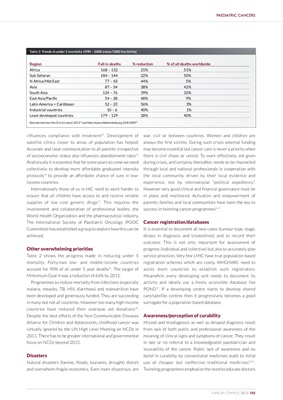
PAEDIATRIC CANCERS
Table 2: Trends in under 5 mortality 1990 – 2008 (rates/1000 live births)
Region Fall in deaths % reduction % of all deaths worldwide
Africa 168 – 132 21% 51%
Sub Saharan 184 – 144 22% 50%
N Africa/Mid East 77 – 43 44% 5%
Asia 87 – 54 38% 42%
South Asia 124 – 76 39% 32%
East Asia/Pacific 54 – 28 48% 9%
Latin America + Caribbean 52 – 23 56% 3%
Industrial countries 10 – 6 40% 1%
Least developed countries 179 – 129 28% 40%
Data derived from You D et al Lancet 201216 and http://www.childmortality.org 20/8/200917
influences compliance with treatment12. Development of war, civil or between countries. Women and children are
satellite clinics closer to areas of population has helped. always the first victims. During such crises external funding
Accurate and clear communication to all parents irrespective may become essential but cancer care is never a priority when
13.
of socioeconomic status also influences abandonment rates there is civil chaos or unrest. To work effectively, aid given
Realistically it is essential that for some years to come we need during crises, and certainly thereafter, needs to be channelled
collectively to develop more affordable graduated intensity through local and national professionals in cooperation with
protocols14 to provide an affordable chance of cure in low- the local community driven by their local evidence and
income countries. experience, not by international “political expediency”.
Internationally those of us in HIC need to work harder to However very good clinical and financial governance must be
ensure that all children have access to and receive reliable in place and monitored. Activation and empowerment of
supplies of low cost generic drugs15. This requires the parents, families and local communities have been the key to
involvement and collaboration of professional bodies, the success in twinning cancer programmes5,6,7.
World Health Organization and the pharmaceutical industry.
The International Society of Paediatric Oncology (PODC Cancer registration/databases
Committee) has established a group to explore how this can be It is essential to document all new cases (tumour type, stage,
achieved. delays in diagnosis and treated/not) and to record their
outcome. This is not only important for assessment of
Other overwhelming priorities progress (individual and collective) but also to accurately plan
Table 2 shows the progress made in reducing under 5 service provision. Very few LMIC have true population-based
mortality. Forty-two low- and middle-income countries registration schemes which are costly. WHO/IARC need to
account for 90% of all under 5 year deaths16. The target of assist more countries to establish such registration.
Millennium Goal 4 was a reduction of 66% by 2015. Meanwhile every developing unit needs to document its
Programmes to reduce mortality from infections (especially activity and ideally use a freely accessible database like
malaria, measles, TB, HIV, diarrhoea) and malnutrition have POND19. If a developing centre starts to develop shared
been developed and generously funded. They are succeeding care/satellite centres then it progressively becomes a good
in many but not all countries. However too many high-income surrogate for a population-based database.
countries have reduced their overseas aid donations18.
Despite the best efforts of the Non Communicable Diseases Awareness/perception of curability
Alliance for Children and Adolescents, childhood cancer was Missed and misdiagnosis as well as delayed diagnosis result
virtually ignored by the UN High Level Meeting on NCDs in from lack of both public and professional awareness of the
2011. There has to be greater international and governmental meaning of clinical signs and symptoms of cancer. They result
focus on NCDs beyond 2015. in late or no referral to a knowledgeable paediatrician and
incurability of the cancer. Public lack of awareness and no
Disasters belief in curability by conventional medicines leads to initial
Natural disasters (famine, floods, tsunamis, drought) distort use of cheaper but ineffective traditional medicines20,21.
and overwhelm fragile economics. Even more disastrous, are Twinning programmes emphasize the need to educate doctors
CANCER CONTROL 2013 105